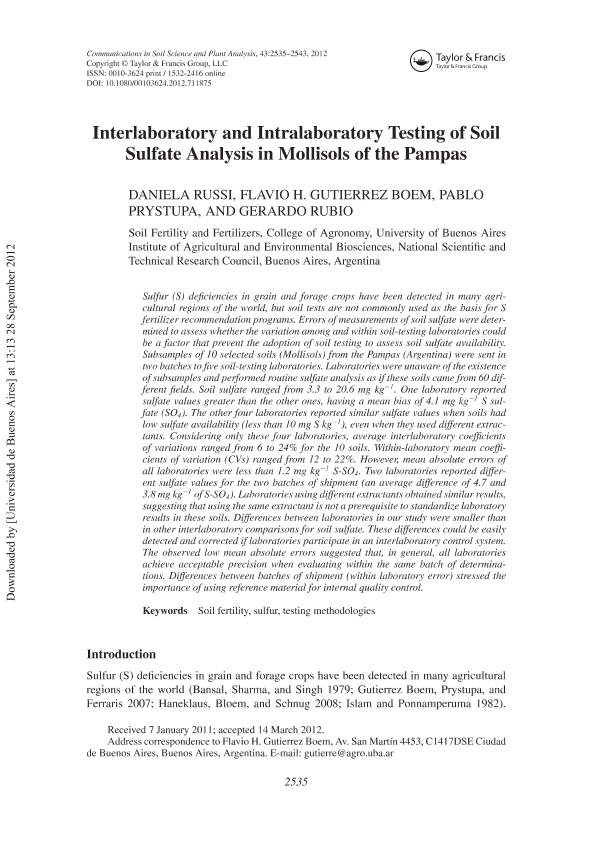Mostrar el registro sencillo del ítem
dc.contributor.author
Russi, Daniela

dc.contributor.author
Gutiérrez Boem, Flavio Hernán

dc.contributor.author
Prystupa, Pablo

dc.contributor.author
Rubio, Gerardo

dc.date.available
2018-09-17T15:23:35Z
dc.date.issued
2012-10
dc.identifier.citation
Russi, Daniela; Gutiérrez Boem, Flavio Hernán; Prystupa, Pablo; Rubio, Gerardo; Interlaboratory and Intralaboratory Testing of Soil Sulfate Analysis in Mollisols of the Pampas; Taylor ; Communications in Soil Science and Plant Analysis; 43; 19; 10-2012; 2535-2543
dc.identifier.issn
0010-3624
dc.identifier.uri
http://hdl.handle.net/11336/59854
dc.description.abstract
Sulfur (S) deficiencies in grain and forage crops have been detected in many agricultural regions of the world, but soil tests are not commonly used as the basis for S fertilizer recommendation programs. Errors of measurements of soil sulfate were determined to assess whether the variation among and within soil-testing laboratories could be a factor that prevent the adoption of soil testing to assess soil sulfate availability. Subsamples of 10 selected soils (Mollisols) from the Pampas (Argentina) were sent in two batches to five soil-testing laboratories. Laboratories were unaware of the existence of subsamples and performed routine sulfate analysis as if these soils came from 60 different fields. Soil sulfate ranged from 3.3 to 20.6 mg kg-1. One laboratory reported sulfate values greater than the other ones, having a mean bias of 4.1 mg kg-1 S sulfate (SO4). The other four laboratories reported similar sulfate values when soils had low sulfate availability (less than 10 mg S kg-1), even when they used different extractants. Considering only these four laboratories, average interlaboratory coefficients of variations ranged from 6 to 24% for the 10 soils. Within-laboratory mean coefficients of variation (CVs) ranged from 12 to 22%. However, mean absolute errors of all laboratories were less than 1.2 mg kg-1 S-SO4. Two laboratories reported different sulfate values for the two batches of shipment (an average difference of 4.7 and 3.8 mg kg-1 of S-SO4). Laboratories using different extractants obtained similar results, suggesting that using the same extractant is not a prerequisite to standardize laboratory results in these soils. Differences between laboratories in our study were smaller than in other interlaboratory comparisons for soil sulfate. These differences could be easily detected and corrected if laboratories participate in an interlaboratory control system. The observed low mean absolute errors suggested that, in general, all laboratories achieve acceptable precision when evaluating within the same batch of determinations. Differences between batches of shipment (within laboratory error) stressed the importance of using reference material for internal quality control. © 2012 Copyright Taylor and Francis Group, LLC.
dc.format
application/pdf
dc.language.iso
eng
dc.publisher
Taylor

dc.rights
info:eu-repo/semantics/openAccess
dc.rights.uri
https://creativecommons.org/licenses/by-nc-sa/2.5/ar/
dc.subject
Soil Fertility
dc.subject
Sulfur
dc.subject
Testing Methodologies
dc.subject.classification
Agricultura

dc.subject.classification
Agricultura, Silvicultura y Pesca

dc.subject.classification
CIENCIAS AGRÍCOLAS

dc.title
Interlaboratory and Intralaboratory Testing of Soil Sulfate Analysis in Mollisols of the Pampas
dc.type
info:eu-repo/semantics/article
dc.type
info:ar-repo/semantics/artículo
dc.type
info:eu-repo/semantics/publishedVersion
dc.date.updated
2018-09-12T19:11:00Z
dc.journal.volume
43
dc.journal.number
19
dc.journal.pagination
2535-2543
dc.journal.pais
Estados Unidos

dc.journal.ciudad
Londres
dc.description.fil
Fil: Russi, Daniela. Consejo Nacional de Investigaciones Científicas y Técnicas; Argentina. Universidad de Buenos Aires. Facultad de Agronomía. Departamento de Ingeniería Agrícola y Uso de la Tierra. Cátedra de Fertilidad y Fertilizantes; Argentina
dc.description.fil
Fil: Gutiérrez Boem, Flavio Hernán. Consejo Nacional de Investigaciones Científicas y Técnicas; Argentina. Universidad de Buenos Aires. Facultad de Agronomía. Departamento de Ingeniería Agrícola y Uso de la Tierra. Cátedra de Fertilidad y Fertilizantes; Argentina
dc.description.fil
Fil: Prystupa, Pablo. Universidad de Buenos Aires. Facultad de Agronomía. Departamento de Ingeniería Agrícola y Uso de la Tierra. Cátedra de Fertilidad y Fertilizantes; Argentina
dc.description.fil
Fil: Rubio, Gerardo. Consejo Nacional de Investigaciones Científicas y Técnicas; Argentina. Universidad de Buenos Aires. Facultad de Agronomía. Departamento de Ingeniería Agrícola y Uso de la Tierra. Cátedra de Fertilidad y Fertilizantes; Argentina
dc.journal.title
Communications in Soil Science and Plant Analysis

dc.relation.alternativeid
info:eu-repo/semantics/altIdentifier/doi/https://dx.doi.org/10.1080/00103624.2012.711875
dc.relation.alternativeid
info:eu-repo/semantics/altIdentifier/url/https://www.tandfonline.com/doi/abs/10.1080/00103624.2012.711875
Archivos asociados
